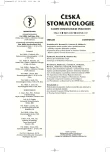-
Medical journals
- Career
Corrosion of Dental Alloys
Authors: L. Vavřičková 1; T. Dostálová 2; D. Vahalová 1; J. Šrámková 3
Authors‘ workplace: Stomatologická klinika LF UK a FN, Hradec Králové 1; Dětská stomatologická klinika 2. LF UK a FN Motol, Praha 2; Univerzita Pardubice, Fakulta chemicko-technologická, Pardubice 3
Published in: Česká stomatologie / Praktické zubní lékařství, ročník 107, 2007, 5, s. 87-93
Category:
Overview
This clinical study assessed the corrosion behaviour of 4 types of nickel - chromium casting alloys commonly used in prosthodontic practice.
Aim:
The aim of study was to verify deposition of nickel and chromium into saliva after the dental product insertion into the mouth, to determine their exact concentrations by ET – AAS method. Further on, the project observed dynamics of metals changing release during certain time period and passive layer formation time.Methods:
The research methodology was based on combining clinical study with laboratory testing. Fifteen volunteers delivered saliva samples to sterile tube at designated time. The saliva was handed over at 0 hours, 0.5 hours, 3 hours after delivering simulated denture made of 4 dental alloys widely available on our market. Last sample was taken after 7 days of everyday denture use for at least 3 hours. Individual samples were analyzed by ET - AAS.Results:
We collected about 240 saliva samples. Our study determined that chromium release depends on the dental alloy composition and the time after delivering simulated denture. The nickel release depends only on the delivering time, but not on the alloy composition. The highest nickel and chromium release was after 30 minutes, after 7 days the release was approximately the same as in the 3-hour saliva sample.Conclusions:
Our project demonstrated that all analysed dental alloys – Remanium G soft, Wiron 99, Wirolloy and Heraenium NA could be used for dental dentures producing. Laboratory testing showed, comparing both nickel and chromium releases, Heraenium should be afraid of in the group of patients with the allergy inclination, compared to Remaium G soft and its lowest nickel and chromium concentrations can be considered as secure as possible.Key words:
dentistry - dental alloy - corrosion - release of Ni and Cr elements
Labels
Maxillofacial surgery Orthodontics Dental medicine
Article was published inCzech Dental Journal

2007 Issue 5-
All articles in this issue
- Longitudial Study of Oral Health in Preschool Children - Results of Entry Clinical Examination
- Anchorage in Orthodontic Treatment
- The Importance of the Dental Hygienist Activities in Occupational Oral Hygiene of Periodontium Patients Evaluated in Improved Condition of Oral Hygiene and Periodontium as Examined by the CPITN Index
- Low-viscosity Composite Filling Materials as an Alternative in Treating Cervical Defects
- Anatomical Deviations of Endodontium as a Cause of Failure of Endodontic Treatment
- Corrosion and Ion Release from Metal Prosthetic Appliances
- Corrosion of Dental Alloys
- Non-surgical Treatment of a Tooth Associated with a Large Periapical Radiolucency Resembling Periapical Cyst
- Czech Dental Journal
- Journal archive
- Current issue
- Online only
- About the journal
Most read in this issue- Non-surgical Treatment of a Tooth Associated with a Large Periapical Radiolucency Resembling Periapical Cyst
- Anatomical Deviations of Endodontium as a Cause of Failure of Endodontic Treatment
- Anchorage in Orthodontic Treatment
- The Importance of the Dental Hygienist Activities in Occupational Oral Hygiene of Periodontium Patients Evaluated in Improved Condition of Oral Hygiene and Periodontium as Examined by the CPITN Index
Login#ADS_BOTTOM_SCRIPTS#Forgotten passwordEnter the email address that you registered with. We will send you instructions on how to set a new password.
- Career

